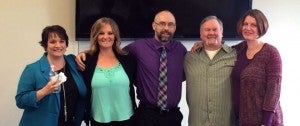By: Cory Montgomery, Master of Social Work student in Twin Falls, Idaho

A group of Boise State Master of Social Work students from the Extended Studies Program in Twin Falls were assigned a task in their Community Macro Class: to find a social issue and follow this issue through the planned change process. The assignment included identifying a community issue, writing a research-based analysis of the problem, completing a community assessment, conducting contact interviews, forming a logic model, implementing an intervention plan (complete with timeline and tasks) and sharing the information amongst the peer group and community.
The issue in the Twin Falls community that they identified was the lack of bed space in the Safe and Sober Housing program for recovering addicts out of treatment as well as returning citizens from our justice system. Through their research, the Boise State students found that there was an immediate need for more beds and a lack of funding for the cause. Through the community assessment, they also found out that Twin Falls utilizes more of a housing first model (providing housing as quickly as possible and then providing services as needed) in transitional housing, but that therapeutic approaches were needed in existing residential treatment facilities to further improve the chances of full recovery from addictions. Their main focus was on the limited amount of houses and the lack of availability to gain access to a safe and sober bed. Most houses had long waiting lists and weren’t accepting applications any longer. The issue was exacerbated by the alarming fact that Twin Falls does not have an emergency homeless shelter.
The students identified a mission for their project: to increase the amount of beds available in the Safe and Sober Housing program in the Twin Falls community.
The group developed a plan to invite nonprofits and for-profits to come down from Boise to share information and funding sources with the Twin Falls Transitional Housing Community. Their goal was to have communities collaborate and hopefully form coalitions within the safe and sober community. Teaming up with City Council members allowed the students to secure the brand new Chamber of Commerce facility on the canyon and allowed them to invite important players with formal letter invitations signed and sealed from the Twin Falls Area Chamber of Commerce CEO Shawn Barigar. The design of the event, held April 7, included guest speakers from Boise and Twin Falls communities, group presentations, and a meet-and-greet luncheon afterwards to facilitate networking.
A total of 48 participants packed the new facility. Participants included employees from Drug Court and the Safe and Sober Housing program, City Council Members, County Council Members, CSI Faculty, Health and Welfare employees, TARC treatment representatives, employees from Bridging the Gap and Preferred Child and Family Services, residents interested in starting houses, residents looking for a bed, Probation and Parole officers, employees from the South Central Community Action Partnership and finally, other Boise State Master of Social Work students. Participants exchanged information by bringing brochures, business cards, and other materials. The local television news reported on the meeting and overall the event was considered a success. Even though the students’ original goal was simply to have the community start to network in solving the issue of lack of housing, the results were even further reaching- they gained commitments from one organization and two individual private citizens- bringing the students steps closer to achieving their actual mission of increasing beds.
Read more about the student’s project on their Facebook page.